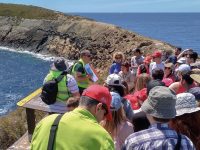
Il·lustració: Moisés Mahiques
The first thing is to know what role you want to assume in this world of scientific communication. You have four options:
First option: No role at all. You do not want to be distracted for a minute with outreach activities. Perfect, then let no one convince you otherwise. If you have no interest or capacity to communicate, devote yourself to doing good science, which is your main job. And I am not being cynical; the statement that scientists are required to communicate is often misinterpreted. If you receive public funding, as an institution and as a group you do have a responsibility to communicate your work, especially when you publish good results or your knowledge on a particular topic can benefit society. But it is not essential that you communicate directly as an individual: you can do it through your institution’s communication office, or hire someone if you have available funds, or delegate it to someone in your team who will do it better and more willingly. Meanwhile, stay focused on your research. This is not the best option for anyone, especially you, but it is valid and preferable if you really have no interest or capacity (there is a reason why scientists are known to be distant and boring). When I give a talk in a research centre and propose all four options, 5–10% of the participants raise their hands in this first one.
Second option: Collaborative role. Communicating is not your priority, nor are you really aware of it, but if you are called by a radio station or proposed to participate in an activity, you will accept because you think it is important, you think it is part of your obligations, or you think it is worthwhile. This is the majority profile. Between 40 and 60% of hands raised in my talks. My general advice here is to prepare well for that specific intervention. Perhaps you do not need to take a course in communication for the rare occasions you will have to do so (it would not do you any harm either, or course). The most practical thing is to make an effort when the opportunity arises and prepare it thoroughly, because it is worth it. Javier Sampedro and I conduct a science section on Sundays in A Vivir, broadcasted by Cadena Ser, in which we invite a scientist every week. A Vivir is the second most popular programme on Spanish radio. It is listened to by many people, with the confidence and empathy that only radio generates. Being there is an opportunity. Well, you would be surprised by the number of guests who arrive without preparing their intervention at all. They may be very careful in their research and scientific presentations, but they show up unprepared to speak in front of thousands of listeners. My advice is to act as if you were promoting a book: think well about the message you want to transmit, the tone you should use, have interesting data prepared, impactful sentences, a funny story, ask the person who called you for information and even the type of questions and, very important: at the time of the presentation you should be hyper-concentrated. Consider it as important as other aspects of your work. If you feel you are lost, ask a colleague or someone from your communication office to help you prepare.I am not saying you should spend two whole days on the subject, but a little preparation makes a big difference, whether you are talking at a radio station, giving a talk, or participating in any activity. And if it goes well, you might find it is rewarding, and you might step into the third option.
Third option: Involved role / hobby. You are convinced that part of your responsibility as a researcher is to communicate science to the population, you like to do it, and you have a total predisposition to participate in whatever is laid out before you. You even value promoting activities on your own. Between 20 and 30% of arms raised. Here the thing starts to get complicated. A first piece of advice is to be proactive, not to wait for them to look for you but to offer yourself. I have gotten most of my career opportunities this way (I offered myself to Redes, the NIH, MIT, El País to write a blog, to a publisher to write a book, to TVE to make El cazador de cerebros…). It is much more efficient to identify a gap and propose or promote a project than to respond (you and dozens of others) to someone else’s request. Even if you publish a good paper, do not rely only on your communication office to push it: try it yourself. I give the example of the radio again because I find it very illustrative: publishers send books to my home. Lots of them. Why? Because they know that if I like one of them, perhaps I will propose its author to be interviewed in an impact program like A Vivir, and that translates into sales. Do you know how many researchers write to me explaining their work and offering to appear in Ser or El cazador de cerebros? Very few. What about communication agencies offering one of their researchers? Very few. We obviously get press releases, but I promise you that if someone writes to us telling a good story, we will listen to it. You must be proactive and offer something good, defined and adapted to where you want to be, be it a media space, a Naukas blog, or organising a series of conferences in your city.
«I am convinced that, in dissemination, illusion is more important than talent»
Another tip: know your strengths and focus on what you do and like best. If you try to create a Youtube channel and you see that it is not working and that it is actually overwhelming you, try something else. If you are good at writing and you really want to write a book, be aware of how painful the process can be, but do it, because I assure you that it is very comforting if it works. If you start out hesitating, just forget about it. Design your strategy taking into account emotional factors. I am convinced that, in this matter of dissemination, illusion is more important than talent. Be adventurous, test yourself, explore, rectify as many times as necessary, and when you find your virtue, enhance it. Oh, and another very obvious piece of advice – and one that I should also apply – is to have an active profile on social networks and to publish strategically on the topics that interest you. It is important to be consistent, define a style, collaborate with others, and from time to time do something excellent that makes a difference… But each situation is particular and deserves specific advice.
Fourth option: Professional paper. You want to leave the laboratory and try to dedicate yourself professionally to scientific communication. In my talks there are always a few hands raised, but I would say they are less than 5% (which is not that low). This is the most complex point because there is no generic advice that will work. Perhaps because I made the leap from the laboratory to communication and it has gone well, I receive many e-mails from young researchers asking for advice in this regard. Analysing each individual situation in detail is complicated, because there are many important details, but I always respond with possible avenues, warnings, economic considerations… which I know can prove useful to them. In fact, several times I have thought of writing a text on how to take the leap from laboratory to communication, so I can refer to it every time I receive a new email. I will take advantage of the fact that I am reaching the maximum length of a Mètode section and publish it in the next issue.





